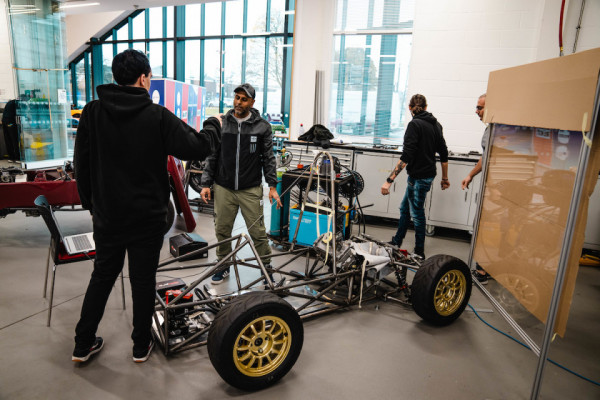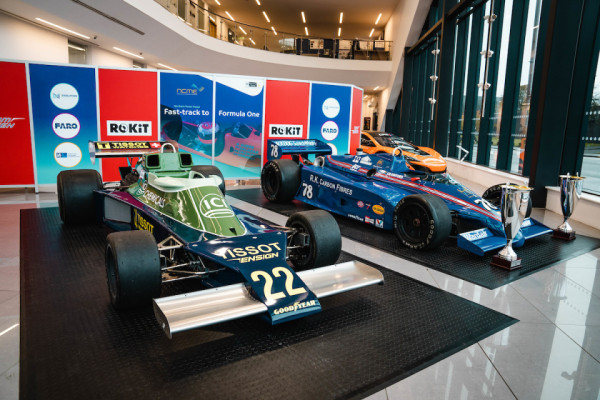
University of Bolton, Deane Road, Bolton. BL3 5AB
Tel:
Email:


“At the University of Bolton, we take great pride in providing a quality, supportive learning environment for our students.”
Professor George E Holmes DL | President & Vice Chancellor
“...tutors are very supportive and you’re not just a student ID number, at this university you are an individual with a name.”
Ellisse Vernon | BSc (Hons) Adult Nursing
Back to menu
Back to menu
Study with an Off-Campus Partner
Back to menu
Back to menu
University of Bolton, why we are the right choice
Location - Bolton, Greater Manchester

26/05/2023
Finding your dream job can be challenging. Most students need help with getting the right career qualifications but if a career in Motorsport is on your horizon, we can help you get into this growing field. The UK automotive industry contributes a £67 billion turnover to the economy, employing about 780,000 people. So how do you claim your piece of the pie? We’ll tell you what’s involved and why working in motorsport could be a dream come true.
Why study motorsport engineering?
It is a growing industry
Estimates state the UK motorsports market has an annual turnover of £9 billion from 4500 companies. This results from its rising popularity worldwide. Broadcasters are investing to earn broadcasting rights and the sport provides a significant revenue source for event participants and organisers alike.
Continuous innovation also drives the industry's growth. Manufacturers focus on research and development to upgrade their vehicles. These investments lead to new career opportunities for motorsport engineering degree students and support industries like energy, technology and insurance.
It provides lots of practical experience
Motorsport engineering degree programs offer real-life experience working on live projects. You gain practical experience through workshops, laboratory sessions and industry collaborations.
For example, Bolton University's motorsport engineering degree students have access to the National Centre for Motorsport Engineering. It's a £13 million facility with specialist workshops and laboratories for automotive and motorsport engineering study.
It qualifies you for global career opportunities
Motorsports are global events with participants from different countries. A motorsport engineering degree opens career opportunities outside your home country. As a result, you could work in diverse environments and experience different cultures during your career.
It equips you with transferrable skills
A motorsport engineering degree develops your data analysis, problem-solving and teamwork skills. You can apply these to aerospace, renewable energy and mechanical engineering industries easily and nearly every other industry generally.
It helps you build valuable networks
A motorsport engineering degree program lets you network with subject-matter experts and employers. You can leverage these relationships for jobs, mentorship and funding opportunities.
It provides access to the latest technologies
Vehicle manufacturers are looking for ways to increase performance and improve efficiency. This requires them to develop new technologies and innovate existing systems. A motorsport engineering degree puts you at the forefront of the latest technologies and boosts your creative skills.
 Is motorsport engineering the same as automotive engineering?
Is motorsport engineering the same as automotive engineering?
Scope of work
A motorsport engineering degree focuses on designing, developing and optimising high-performance vehicles. It combines various engineering aspects to enhance race vehicles' performance, safety and reliability.
Automotive engineering applies engineering principles to produce safe, efficient and reliable road vehicles. It focuses on manufacturing automobiles that meet everyday consumer needs and expectations.
Course subjects
A motorsport engineering degree program may include these subjects:
Powertrain systems
You learn to improve engine power output, durability and efficiency for high-performance vehicles.
Aerodynamics
You focus on reducing the race car's drag and maximising downforce. Students conduct wind tunnel testing and use computational fluid dynamics to create the best aerodynamic race car designs.
Data analysis
Motorsport engineering degree graduates need expert skills to interpret race car data. This lets them determine the best car setup and race strategy for different events.
Vehicle dynamics
Motorsport engineering degree students will learn about various race car characteristics. Your coursework includes analysing and fine-tuning the vehicle's braking, steering and suspension systems.
Core subjects in automotive engineering are:
Chassis and suspension systems
Students focus on designing and developing automobile structural support systems. You gain knowledge of suspension geometry, damping characteristics and spring rates and look to achieve optimal ride and vehicle handling settings.
Safety systems
You improve the vehicle's safety features to protect occupants during accidents. You learn active and passive features like driver assists and airbag design.
Vehicle electronic systems
Students improve their knowledge of car systems like climate control and navigation modules. They design and integrate the vehicle's electronic systems, ensuring proper function and compatibility.
Career options
Motorsport engineering degree graduates often work with race teams. They enhance vehicle performance and achieve racetrack success. They also collaborate with other engineering disciplines to develop new race technologies.
Automotive engineers develop reliable vehicles for the general public. They work with raw material suppliers, manufacturing teams and regulatory authorities. Their focus is to meet safety and environmental standards.
Is a motorsport engineering degree right for you?
It combines your passion for motorsports and your expertise
A motorsport engineering degree is a front-row seat to all motor racing aspects. You gain valuable skills designing, building and testing high-performance vehicles. Plus, you can specialise in aerodynamics or powertrain systems and boost the industry's growth.
It has limitless opportunities
A motorsport engineering degree provides fundamental knowledge and transferrable skills across many industries. Your qualifications open up job opportunities in the public and private sectors. Graduates can pursue careers in the automotive, marine or education industries.
It offers continuous challenges
Do high-pressure work environments, tight deadlines and ambitious targets excite you? Then, a motorsport engineering degree suits you. Race car manufacturers are always seeking a competitive edge. And they need creative and innovative employees to put in place their strategies. This degree provides you with the necessary skills for these exciting roles.
Motorsport engineering degree jobs
Organisations offering graduate jobs in the UK include Alpine SAS, Xtract and Helix. Here are some of the available jobs:
Mechanical designers (aerodynamics)
They create mechanical designs for the test facility's wind tunnels and aero instrumentation. They also investigate and research new technologies. Overall, these designers look to improve the performance and reliability of engineering systems. Applicants must have excellent Computer-aided Design (CAD) skills and top-level motorsport experience.
Electronics engineers
They design and develop electronic circuitry and sub-components for motorsport and automotive products. They also support with maintenance and improvement of departmental procedures.
BIM Coordinator
The role involves administering standards, offering new technological recommendations and pioneering pilot projects. You will collaborate with other consultants to develop innovative service streams. But a strong knowledge of Building Information Modelling (BIM) standards is necessary.
What do you do as a motorsport engineer day-to-day?
Motorsport engineering degree graduates have varying responsibilities depending on their speciality. Those specialising in design, testing or production are responsible for the following:
- Creating prototypes with computer-aided design (CAD) software
- Building production models and conducting quality control checks
- Developing new concepts to optimise vehicle performance, strength and safety
Racing specialists are responsible for the following:
- Vehicle configuration to suit weather and track conditions
- Providing technical instructions to racing drivers
- Monitoring vehicle performance data during races
- Conducting post-race tests and assessing vehicle damage
What qualifications do you need to become a motorsport engineer?
- A motorsport engineering degree
- Good knowledge of engineering principles and their application in motor racing
- Practical experience from internships with race car manufacturers, engineering firms or motorsports teams
- Specialist motorsport skills like Computational Fluid Dynamics (CFD) or Computer-aided Design (CAD)
- Certification and membership from professional organisations like the Institution of Mechanical Engineers (IMechE) or the Society of Automotive Engineers (SAE)

Is motorsport engineering worth it?
Graduating with a motorsport engineering degree has these benefits:
It is in high demand
Automakers often hire graduates to boost their innovation strategies. They provide them with practical experience and resources to become highly-skilled professionals. Companies always seeking new talent include Williams Racing, M-Sport UK and Red Bull Racing.
It pays well
According to the UK's National Career Service, the average annual salary for an entry-level motorsport engineer is £22,000. Those with specialist training can start with an average yearly compensation of £37,241. Figures may vary depending on the company, role requirements and job location.
It qualifies you for senior roles
Combining work experience with a degree makes you eligible for professional certifications like Chartered Motorsport Professional (CMP). This verifies your credibility and employers will trust you with more advanced roles.
What GCSE do you need to be an F1 engineer?
- Two level 3 subjects and these must include a mathematics-based and science-based subject. For example, A-level Mathematics and Physics
- Five GCSEs at grade C and above, including English, Science and Mathematics
- International students must have IELTS 6.0 with a minimum of 5.5 in any band if English is not their first language
- Some universities also accept students with a Higher National Diploma or Certificate in an appropriate engineering discipline, provided they achieve the desired scores in Mathematics and Science. You may have to take additional assessments to determine your course eligibility
Studying motorsport engineering at Bolton University
We have over 40 years of experience in teaching engineering, ranking us as the #1 University in Greater Manchester for Student Satisfaction by the Complete University Guide 2020. Our undergraduate motorsport engineering degrees have accreditation from the Institute of Mechanical Engineering (IMechE) and they meet the academic requirements leading to Incorporated Engineer (IEng) status.
We’ll help you develop in-demand motorsport-specific skills in our state-of-the-art specialist workshops and laboratories. By studying with us, you will learn from top industry professionals, including international racing teams like Speedwork Motorsport and supercar manufacturers like Keating Supercars.
Conclusion
If you want to learn what it takes to run a race and championship-winning team on every level, enrol for a motorsport engineering degree at Bolton University. For more on our Motorsport and Automotive Performance Engineering courses, reach us at enquiries@bolton.ac.uk or call +44 1204 903251. We look forward to helping you develop your career in this high-octane industry via our #UniAsItShouldBe approach.